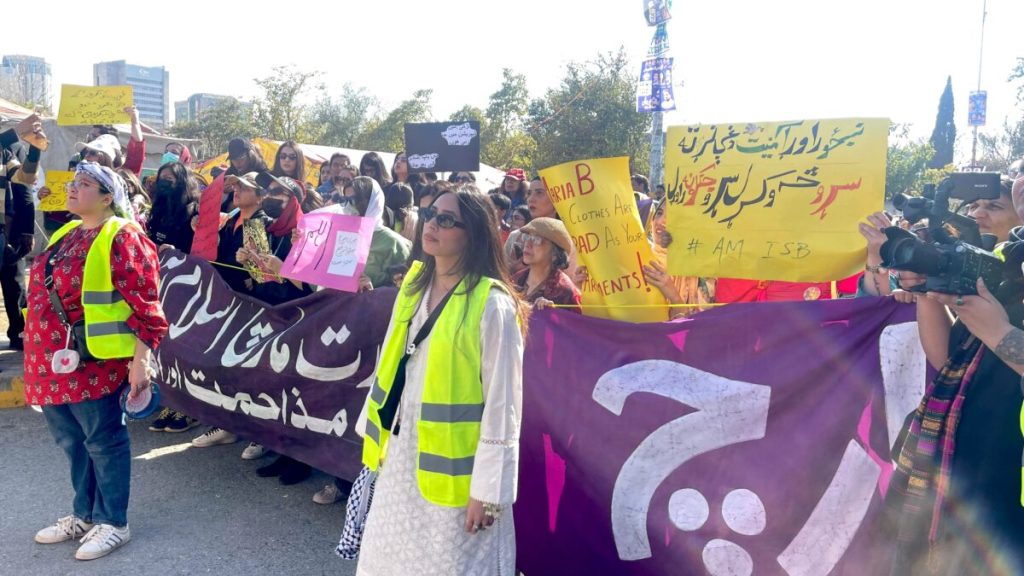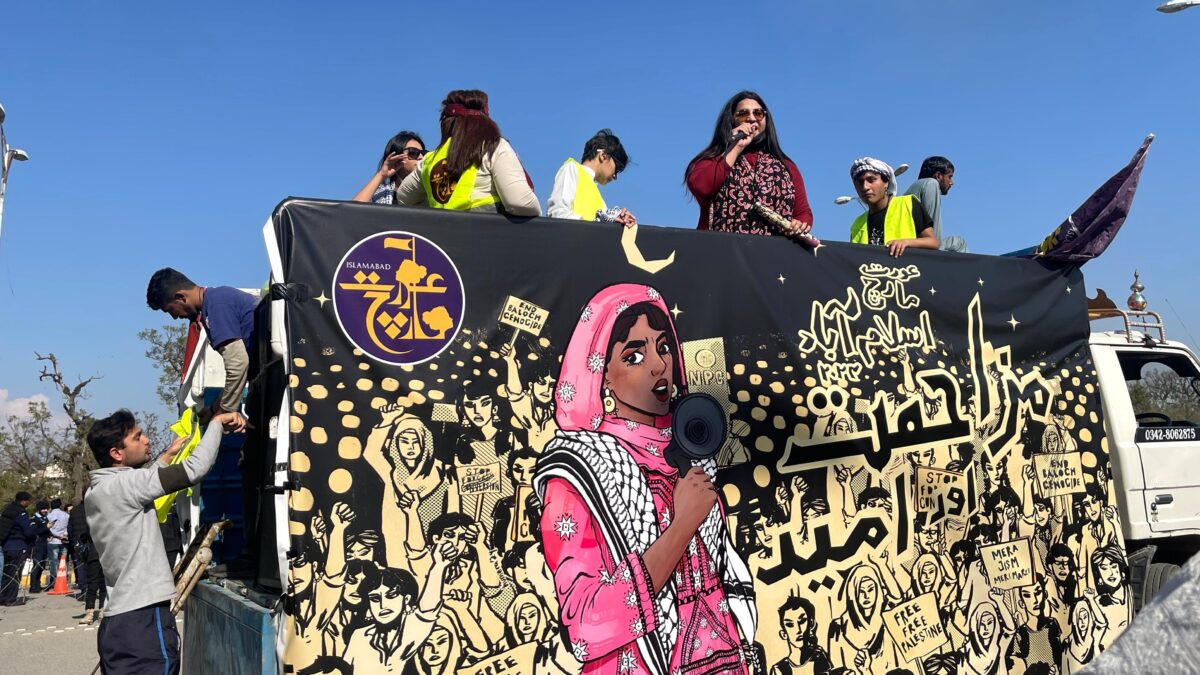Written by Ramna Saeed and R Umaima Ahmed
On International Women’s Day, March 8, women in major cities across Pakistan, including Islamabad, Lahore, Karachi and Multan, took to the streets for the seventh consecutive year to advocate for gender equality, justice, and safety against patriarchal norms.
Aurat March is a feminist collective that unites to speak out against discrimination and inequality. The march was attended by hundreds of women, girls, transgender people, and male allies across Pakistan.
The theme of the Aurat March was the liberation and support of Palestine, with each chapter also presenting manifestos on topics related to gender equality.
Unrest in the Islamabad March
The women marchers of Islamabad’s Aurat March carried placards with messages of solidarity with oppressed communities, such as the apartheid happening in Gaza and the forced disappearances and extrajudicial killings in Balochistan, Pakistan.
Placards also highlighted women’s desire to walk home safely without the fear of being harassed. This is a very common concern for women in Pakistan, as they often face sexual harassment and violence in public spaces.
Throughout the march, the women chanted slogans about Gaza, showing their support for Gaza, where over 25,000 women and children have tragically lost their lives in Israel’s conflict with Gaza since October 7, 2023. The atmosphere was charged with emotion and determination as the women raised their voices for justice and equality.
However, the march faced challenges from the police and authorities.
The number of women gathered at the protest was notably fewer than in previous years, and reports indicated that the police escalated the situation by creating physical barriers and deploying police prison vans. Aurat march organizers say they have faced intense backlash from the authorities in recent years, which may have impacted attendance numbers. Bariya Shah, organizer of Aurat March, told Global Voices via WhatsApp:
Last year there was even more violence done by the police, then at the next following year the ratio of people tends to decrease due to the fear of being beaten by the police or getting arrested.
Aurat March organizers alleged that police committed violence:
Iman Hazir Mazari, a lawyer and human rights activist, told Global Voices at the Aurat March Protest in Islamabad: “The state always protects those who are violent and acts against those who are peacefully protesting” (she pointed towards the peaceful Aurat March protestors).
‘Politics, Resistance, Liberation and Freedom’
This year, Aurat March held a feminist press conference to make the march an inclusive and safe space for women and transgender journalists to interact with the volunteers. Unlike the past six years, Aurat March had to face a highly volatile environment of male journalists at the Lahore Press Club.
Mehreen Burney, a journalist from The Current, a digital news startup said:
The manifesto referenced in her tweet discusses climate change, transparency in election results, increasing women’s representation in the National Assembly and politics, ending enforced disappearances, and condemning the interim government’s decision to deport Afghan refugees.
The march in Lahore attracted attendees from diverse backgrounds, including students, transgender individuals, women factory workers, and senior women activists who have been instrumental in advancing women’s rights in Pakistan. Manifestos were distributed among participants, and various performances were held to convey the message.
Several art installations exploring politics and resistance were erected to protest against local and international injustices. One installation was a street harassment tunnel, depicted in the following tweet:
Despite the organizers’ peaceful intentions, some independent YouTubers tried to sabotage the march by harassing the participants with obnoxious questions and creating malicious videos to propagate extremist mentality.
During the march, a participant was asked whether they were a man or a woman, to which they refused to respond. The YouTuber then insisted, “Give a test drive to prove your gender.”
Aurat March in Karachi
Aurat march in Karachi was highly creative and impactful; featuring three distinct sessions held in different areas of Frere Hall Gardens, each addressing important topics: Minority rights, forced conversions, economic empowerment of women, and transgender rights. The march was vibrant and colorful, drawing participants from civil society, lawyers, activists, and students. Speeches underscored the suffering of families with disappeared or abducted loved ones and expressed solidarity with the pain, loss, and tears of the Palestinian people.
Michelle Chaudary, President of the Cecil & Iris Chaudhry Foundation (CICF) and a supporter of Aurat March, told Global Voices on WhatsApp: “For years, women and girls from Hindu and Christian communities have been victims of forced conversion, and we appreciate that the Aurat March has addressed this issue on such a large scale.”
No march would be complete without installations, and Karachi’s march was no exception. A statue symbolizing patriarchy was erected and later burned to symbolize women’s rage and frustration.
The other installation was a graveyard of the patriarchy, expressing how it has killed women, children, and transgender people:
Breaking the chains of economic slavery
Multan’s Aurat March opted for the theme of breaking the chains of economic slavery and put forward demands for education for all, the right to identity, student empowerment, fair wages, worker rights, child protection, and more. Just as those in Lahore faced harassment, in Multan, a male journalist was allegedly seen harassing participants, hurling sexual slurs, and using derogatory remarks. A statement was issued demanding an apology from the journalist of the Associated Press.

Aurat March was not only about raising awareness regarding women’s issues but also served as a platform for artistic performances and cultural resistance. Despite facing various obstacles and challenges, women in Pakistan are determined to persist in their struggle with strength and resilience until they achieve gender equality and secure their rights.







